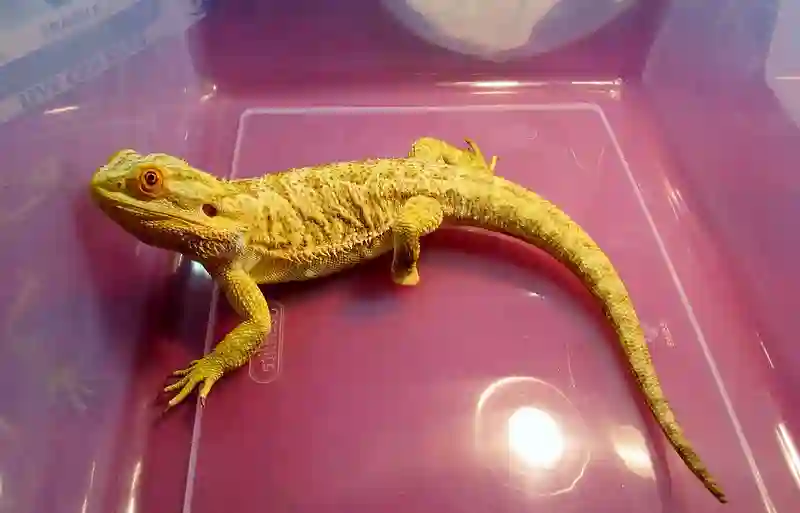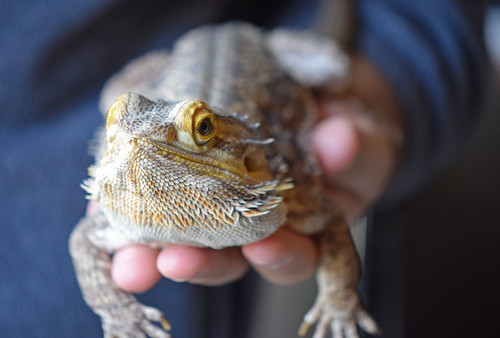Bearded dragons may not instinctively know to drink from a bowl of still water, so it can be difficult to get them to drink water from a bowl.
Here are some techniques that can be used to encourage a bearded dragon to drink water:
- Make the water move by adding a droplet of water on its snout, squirting a water sprayer directly into the bowl, or adding an airstone to the bowl connected to a small air pump.
- Mix a little natural fruit juice with the water to make it tasty and encourage the bearded dragon to drink from the bowl.
- Offer water in a bowl, hand spraying, bathing, waterfall, or syringe.
- Feed vegetables with high water content or insects such as hornworms to provide water to the bearded dragon.
It may take hours, days, or weeks to encourage a bearded dragon to drink from a bowl, and some may never do it. It is important to keep an eye on the bearded dragon to make sure that it is drinking and to clean the water dish every day since they will often defecate in their bowls.
Common Reasons Why Bearded Dragons Don’t Drink Water
A common challenge many bearded dragon owners face is getting their pets to drink enough water. There are several reasons why a bearded dragon may not drink water:
- Inadequate access to water: if the water dish is too small or not changed regularly enough, it can discourage your bearded dragon from drinking.
- Poor quality of water: your bearded dragon may refuse to drink tap water due to high levels of chlorine or other chemicals present in the water.
- Dry environment: Bearded dragons originate from arid regions where they get most of their moisture from food sources and dew. They may find it challenging to adapt to a humid environment where standing water is readily available.
- Dietary factors: feeding your bearded dragon a diet that lacks sufficient moisture content can affect its drinking habits.
- Sickness or stress: if your bearded dragon is sick or stressed, it may not drink enough water leading to dehydration.
Now that we understand the importance of hydration for bearded dragons and some of the reasons why they may not drink enough water, we can explore ways to encourage your pet bearded dragon to drink more water.
Understanding Your Bearded Dragon’s Water Needs
Water requirements for bearded dragons
Bearded dragons require water to survive, just like any other living creature. However, their water needs are different from other animals.
Typically, bearded dragons do not drink water as often as other reptiles. They generally obtain moisture from their food and the environment around them.
The amount of water a bearded dragon requires depends on its age, size, and activity level. For example, a younger dragon will require more water than an older one because they are growing and active.
Similarly, larger dragons will need more water than smaller ones because they have a larger body mass to maintain. It is essential to provide your bearded dragon with fresh drinking water at all times, even if it doesn’t seem to drink it regularly.
Factors that affect water intake in bearded dragons
Several factors can affect how much water your bearded dragon drinks: Firstly, the temperature of the environment can impact hydration levels in your pet.
If the enclosure is too hot or cold for your pet’s comfort level, they may not drink enough water.
Secondly, the type of food you feed your beardie can also impact its hydration levels. If you typically feed them dry foods with low moisture content or high-protein diets that require lots of metabolic waste elimination, then there will be less available fluid for their bodies.
Thirdly, the humidity level in the enclosure plays a significant role. Keep the humidity around 30-40%.
Another thing to consider is whether or not your pet is shedding; when they’re shedding skin, they need extra hydration.
Stressful situations such as traveling in their carrier or handling by an unfamiliar person can cause stress hormone release leading to decreased thirst levels which causes dehydration over time.
All these factors should inform how much attention you pay to providing adequate access to water for your pet.
Encouraging Your Bearded Dragon to Drink Water
Bearded dragons can be finicky when it comes to drinking water, which can be a concern for pet owners. Fortunately, there are several ways to encourage your bearded dragon to drink water.
Providing fresh, clean water at all times
This is the first and most important step in getting your bearded dragon to drink water. Ensure that you provide fresh and clean water at all times.
You should avoid using tap water as it may contain harmful chemicals like chlorine that can affect your beardie’s health. Instead, you can use filtered or bottled water.
Choosing the right type of water dish
The type of water dish you use can also influence your pet’s willingness to drink from it. It is best to use shallow dishes that are easy for them to access and climb in and out of. Avoid using deep dishes as they could accidentally fall in and drown.
Changing the water regularly
You should change the drinking water every day or every other day, depending on how frequently your pet drinks from it. This will help prevent any bacteria growth or contamination which could cause various health problems.
Using a Water Fountain or Drip System
One way to encourage your bearded dragon to drink more is by providing them with a continuous source of running water through a fountain or drip system. This mimics their natural habitat where they would typically find running streams of freshwater.
Offering different types of Water Sources
If your bearded dragon still doesn’t seem interested in drinking from their dish, try offering other types of hydration sources such as spraying them with a mist bottle or soaking them in shallow warm (not hot) water for a few minutes.
You can also try offering them fruits and vegetables with high-water content such as cucumbers or watermelon. By providing your bearded dragon with various hydration sources, you can ensure that they are getting the water they need to stay healthy and hydrated.
Monitoring Your Bearded Dragon’s Hydration Levels
Signs of dehydration in bearded dragons
It is important to know the signs of dehydration in your bearded dragon so that you can act quickly if necessary. Some common signs include lethargy and weakness, sunken eyes, wrinkled skin, lack of appetite, and dry mouth. If you notice any of these symptoms in your dragon, it’s time to take action.
Checking for hydration levels regularly
One way to ensure that your bearded dragon is staying hydrated is by checking their hydration levels regularly. You can do this by performing a skin elasticity test or monitoring their urination frequency. The skin elasticity test involves gently pulling up on the skin behind their neck or shoulders and releasing it.
If the skin returns to its normal position quickly, then your dragon is likely well-hydrated. If it takes longer than usual for the skin to return to its normal position, then your dragon may be dehydrated.
Skin elasticity test
To perform a skin elasticity test, gently pull up on the skin behind your bearded dragon’s neck or shoulders and release it. If the skin snaps back into place quickly, then your dragon is well-hydrated. If it takes longer than usual for the skin to return to its normal position, then your dragon may be dehydrated.
Monitoring urination frequency
Another way to monitor hydration levels is by keeping track of how often your bearded dragon urinates. A healthy bearded dragon should urinate at least once a day. However, if you notice that they are not using the bathroom as often as they should or have discolored urine (such as dark yellow or orange), then they may not be getting enough water.
Conclusion
Ensuring that your bearded dragon is well-hydrated is essential for their overall health and well-being. By providing fresh, clean water at all times, offering different types of water sources, and monitoring their hydration levels regularly, you can help prevent dehydration and keep your dragon healthy.
If you notice any signs of dehydration or have concerns about your bearded dragon’s health, it’s always best to consult with a veterinarian who specializes in exotic pets.

